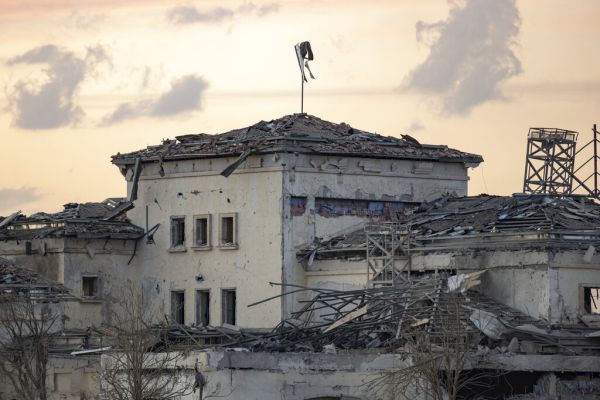An Iraqi-Kurdish tycoon whose villa was destroyed in a ballistic missile strike denied any links to Israeli spies.
By Pesach Benson, United With Israel
Last Sunday, 12 ballistic missiles were fired at the U.S. consulate and a villa in Erbil, which is the capital of Iraq’s Kurdistan province.
After the strike, Iranian Islamic Revolutionary Guards Corps (IRGC) spokesman Ramezan Sharif claimed in an interview on Yemeni TV that Israel used Iraq as a base of operations to launch a strike on an Iranian drone facility in February.
Since the strike on Erbil, Iran’s proxy militias in Iraq echoed the IRGC’s claims that the location that was struck was a base of operations for the Israeli spy agency, the Mossad.
But the Iraqi-Kurdish owner of the badly damaged villa, told Associated Press there’s no Mossad at his place.
Baz Karim Barzinji, CEO of the Iraqi Kurdish oil company KAR group, denied any links to Israeli spies. The missiles gutted his beautiful home, but he said he was grateful his family was unharmed.
Barzinji pointed to a large crater where his home office once stood as he took The Associated Press on a tour of the ruins on Friday. The tycoon, his wife and two teenage children were visiting a nearby farm when the attack took place, he said.
Once plush sitting rooms — where government officials rubbed shoulders with diplomats and other figures of influence — were strewn with glass, pieces of concrete and piles of debris. The windows and the roof were gone, remnants of the mansion walls were barely standing, and floors were covered with rubble.
“This is my family house, all the photos and our belongings” were here, Barzinji said. “It was horrifying.”
His daughter, Ban Karim, recounted huddling in the garden with the family dogs as the thundering missiles whizzed overhead. “We do not know if they can see us, we do not know if they are drones, we do not know anything about ballistics, what is going to happen right now,” she said, speaking in English.”
‘Clearly Nonsense’
An Iraqi intelligence official, speaking on condition of anonymity to discuss the attack, also rejected claims the house was an Israeli spy center, adding it was a place where diplomats often held social gatherings.
“It is clearly nonsense, what the Iranians are talking about. This can be anything but an Israeli base,” Hiwa Osman, an Iraqi Kurdish political analyst, said of Barzanji’s villa.
The IRGC threatened more attacks on Iraq if Baghdad “continues to allow Israel to use its territory” to launch attacks against Iran.
Iran has a “natural right” to destroy bases on foreign soil threatening Iranian security, Sharif said. He added that Iran’s Ambassador to Iraq, Iraj Masjedi, had warned Iraqi Kurds of three sites supposedly being used by Israel in the Kurdish province.
The IRGC, a designated terror group, claimed responsibility for the missile strike. Its statement took the unusual step of referencing “Zionists.”
It was widely assumed that the attack on Erbil was revenge for a March 7 air strike near Damascus widely attributed to Israel. Two IRGC personnel were killed in that strike. But it was subsequently reported that Israel destroyed hundreds of Iranian aerial drones at a base on Iranian soil in February.
An Iranian cyber attack that briefly took Israeli government websites offline on Thursday — the biggest cyber attack on Israel to date — has also been linked to the strike on Iran’s drone base.
Israeli officials have not commented on the reports of either strike.
Iran is trying to pull Iraq into its orbit. Tehran has already established a land bridge across northern Iraq to deliver weapons to its proxies in Syria and Lebanon. Kurdish independence complicates that land bridge. Kurds are supportive of Israel, which is another reason Iran opposes Kurdish independence.
The missile attack on Erbil would be clear message to the Kurds to stop their push for independence and distance themselves from Israel.
Targeting the U.S. consulate as negotiators in Vienna try to finalize the new JCPOA deal may have been a signal to the U.S. that Tehran won’t let a favorable nuclear deal fall through the cracks while the world is preoccupied with the Russian war in Ukraine.
Associated Press contributed to this report.
